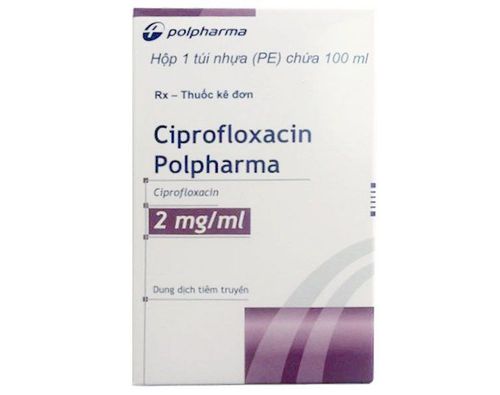This is an automatically translated article.
Cifga is an antibiotic, used to treat infections with susceptible bacteria. To limit the risk of drug resistance, you need to take the drug as prescribed by your doctor.
1. What is Cifga?
Cifga has the main ingredient Ciprofloxacin 500 mg and other excipients such as: tapioca starch, sodium starch glycolate, ludipress, magnesium stearate, PVP K30, HPMC, PEG 6000, titanium dioxide, talc). The drug is in the form of long film-coated tablets.
Cifga with the main active ingredient is Ciprofloxacin, a semi-synthetic, broad-spectrum antibiotic, belonging to the Quinolone drug class, also known as DNA gyrase inhibitors. By inhibiting the enzyme DNA gyrase, Ciprofloxacin prevents the replication of chromosomes, rendering bacteria unable to reproduce. Ciprofloxacin has good effect, even against bacteria resistant to antibiotics of other groups (Aminoglycosides, Cephalosporins, Tetracyclines, Penicillins,...).
2. When is Cifga prescribed?
Cifga antibiotic is indicated for the treatment of the following cases:
Treatment of infectious prostatitis, osteomyelitis, severe bacterial enteritis, sepsis. Uncomplicated Urinary Tract Infections: This drug can cause serious reactions and should only be used in patients who cannot choose an alternative treatment. Acute Infectious Exacerbation of Chronic Bronchitis: Acute bacterial exacerbation of chronic bronchitis in some patients can be treated with other drugs that are less likely to cause adverse reactions; Ciprofloxacin should be used only in patients who do not. There are other, safer treatment options instead. Acute bacterial sinusitis.
3. Notes when using Cifga
Do not use the drug for patients with a history of Ciprofloxacin or Quinolone or other excipients of the drug. Limit the use of Ciprofloxacin to children and growing adolescents. This is an antibiotic used in cases of bacterial infection and is used under the direction of a doctor. Do not arbitrarily use and stop the drug unless indicated. Serious and potentially disabling and potentially irreversible adverse events, including tendinitis, tendon rupture, peripheral neuropathy, and CNS adverse events have been reported with the use of the drug. Fluoroquinolone antibiotics. These reactions may occur simultaneously in the same patient and may occur within hours to weeks of administration. The drug should be discontinued at the first sign or symptom of any serious adverse reaction such as myalgia, tendonitis, etc. Fluoroquinolone antibiotics should be avoided in patients who have had a history of this. serious reactions related to fluoroquinolones. Ciprofloxacin should be used with caution in patients with a history of seizures or central nervous system disorders, impaired liver or kidney function, glucose-6-phosphate dehydrogenase deficiency, myasthenia gravis. Long-term use of Ciprofloxacin may promote the growth of non-susceptible organisms. Therefore, it is necessary to closely monitor the patient and do antibiotics regularly to have appropriate treatment measures. For pregnant women, Ciprofloxacin should be used only in severe, life-threatening infections for which there is no alternative antibiotic. Ciprofloxacin should not be used in nursing mothers, as the drug may reach concentrations harmful to the infant. If a nursing mother is forced to take Ciprofloxacin, breastfeeding should be discontinued. Cifga should be used with caution when driving and operating machinery because it may cause dizziness or lightheadedness. Drug interactions may occur when Cifga is used concurrently with the following drugs:
Non-steroidal anti-inflammatory drugs (Ibuprofen, Indomethacin, ...) increase the side effects of Ciprofloxacin. Concomitant administration of aluminum- and magnesium-containing antacids reduces the serum antibiotic concentration and bioavailability of ciprofloxacin. Avoid concomitant use of Cciprofloxacin with iron or zinc preparations. Sucralfate reduces the absorption of Ciprofloxacin, so antibiotics should be taken 2 to 6 hours before taking Sucralfate. Ciprofloxacin increases serum theophylline concentrations when co-administered. Probenecid reduces renal tubular secretion, so the excretion of the drug through the urine is limited, from which Ciprofloxacin increases in the blood and increases the risk of side effects... In addition, the drug can interact with other drugs. Care should be taken when using concurrently.
Hopefully with the above information you know what Cifga is, how it works and when to use it. This is a prescription drug, so it should only be used when prescribed by a doctor to limit the risk of drug resistance and harm to the body.
Please dial HOTLINE for more information or register for an appointment HERE. Download MyVinmec app to make appointments faster and to manage your bookings easily.













